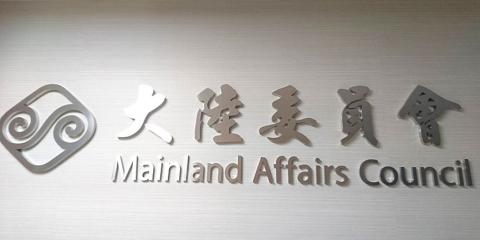Hong Kong on Friday deported 33 Taiwanese for planning to take part in a demonstration today over proposed amendments to the territory’s extradition laws, the Mainland Affairs Council said yesterday.
The deportees are Falung Gong members who were detained at Hong Kong International Airport upon entry and sent back to Taiwan in separate groups, sources said.
The council in a statement expressed regret that Hong Kong would turn away Taiwanese with valid travel documents.

Photo: Chung Li-hua, Taipei Times
“The freedoms of speech and religion are fundamental human rights that should be understood by Hong Kong authorities with rationality and respect,” the council said.
Taiwan’s representative office in Hong Kong said that it did not receive requests from the Taiwanese travelers prior to their attempted entry and that it has reached out to the airline to understand what had transpired.
The Hong Kong Legislative Council on Wednesday last week initiated deliberations on the controversial amendments, which critics have said could broaden Beijing’s power to extradite dissidents from the territory.
Opponents of the proposal are expected to stage a demonstration today to demand that the council retract the bill.
The Hong Kong government as of press time last night had no comment regarding the deportations.
The incident has deepened fears that Hong Kong has established a blacklist to bar people whose opinions are disagreeable to Beijing from entering the territory.
In a 2008 document, the Hong Kong Security Bureau told the Legislative Council that it had established a system to prevent people who are “detrimental to the public interest of Hong Kong” from entering the territory, but disavowed the existence of a list of persona non grata.

EUROPEAN TARGETS: The planned Munich center would support TSMC’s European customers to design high-performance, energy-efficient chips, an executive said Taiwan Semiconductor Manufacturing Co (TSMC, 台積電), the world’s largest contract chipmaker, yesterday said that it plans to launch a new research-and-development (R&D) center in Munich, Germany, next quarter to assist customers with chip design. TSMC Europe president Paul de Bot made the announcement during a technology symposium in Amsterdam on Tuesday, the chipmaker said. The new Munich center would be the firm’s first chip designing center in Europe, it said. The chipmaker has set up a major R&D center at its base of operations in Hsinchu and plans to create a new one in the US to provide services for major US customers,

The Ministry of Transportation and Communications yesterday said that it would redesign the written portion of the driver’s license exam to make it more rigorous. “We hope that the exam can assess drivers’ understanding of traffic rules, particularly those who take the driver’s license test for the first time. In the past, drivers only needed to cram a book of test questions to pass the written exam,” Minister of Transportation and Communications Chen Shih-kai (陳世凱) told a news conference at the Taoyuan Motor Vehicle Office. “In the future, they would not be able to pass the test unless they study traffic regulations

GAINING STEAM: The scheme initially failed to gather much attention, with only 188 cards issued in its first year, but gained popularity amid the COVID-19 pandemic Applications for the Employment Gold Card have increased in the past few years, with the card having been issued to a total of 13,191 people from 101 countries since its introduction in 2018, the National Development Council (NDC) said yesterday. Those who have received the card have included celebrities, such as former NBA star Dwight Howard and Australian-South Korean cheerleader Dahye Lee, the NDC said. The four-in-one Employment Gold Card combines a work permit, resident visa, Alien Resident Certificate (ARC) and re-entry permit. It was first introduced in February 2018 through the Act Governing Recruitment and Employment of Foreign Professionals (外國專業人才延攬及雇用法),

‘A SURVIVAL QUESTION’: US officials have been urging the opposition KMT and TPP not to block defense spending, especially the special defense budget, an official said The US plans to ramp up weapons sales to Taiwan to a level exceeding US President Donald Trump’s first term as part of an effort to deter China as it intensifies military pressure on the nation, two US officials said on condition of anonymity. If US arms sales do accelerate, it could ease worries about the extent of Trump’s commitment to Taiwan. It would also add new friction to the tense US-China relationship. The officials said they expect US approvals for weapons sales to Taiwan over the next four years to surpass those in Trump’s first term, with one of them saying